
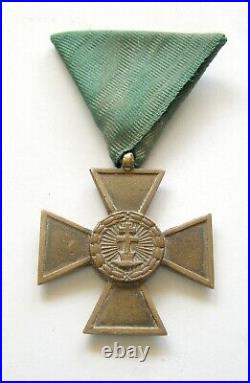
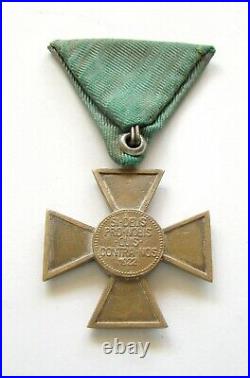
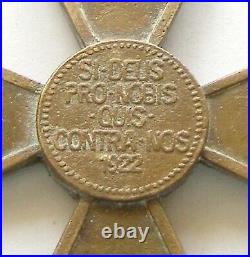

PLEASE SEE THE SCANS! WHAT YOU SEE IS WHAT YOU GET! Powered by SixBit’s eCommerce Solution.


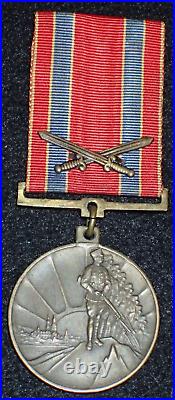
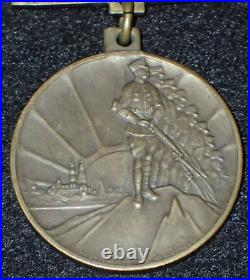
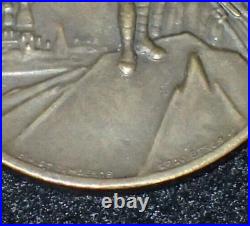
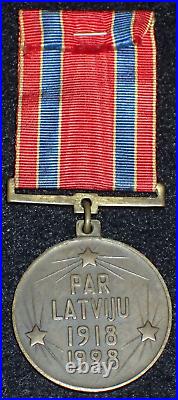
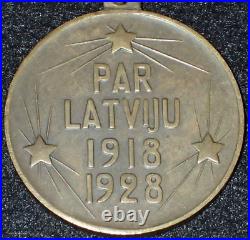
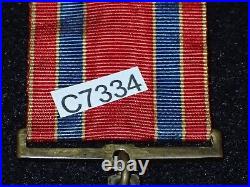

Latvia Latvian 10th Anniversary 1918 – 1928 Liberation Medal Bronze w/ Swords. Original Latvian 10th Anniversary 1918 – 1928 Liberation Medal Bronze with Swords Device, Fine Issued. As Photographed with wear as seen – Period Production / Original Strike. A Nice Candidate for any Collection, Library, or Display. Recent Estate Collection Acquisition & Presented as Acquired, Very Rare. Check back often – we search estates and sources across the world to bring a fine selection of militaria. Please review all photos for details regarding the condition of the item listed – further condition information will be included in the listing as is relevant, if you need additional photographs or have questions regarding the condition please do not hesitate to ask. I describe all items to the best of my ability – please do not hesitate to ask any and all questions prior to the close of the listing. Mistakes very rarely occur – however if one does please rest assured that it will be corrected. International Buyers are Welcome!


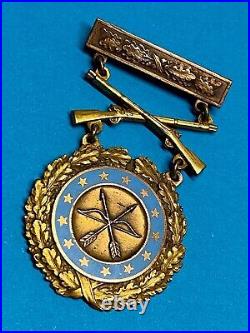
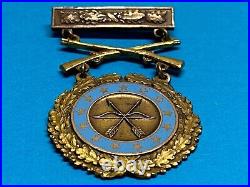
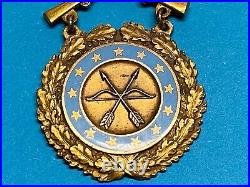
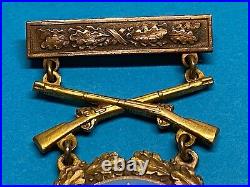
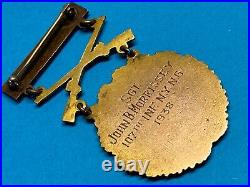
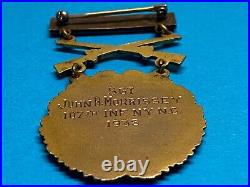
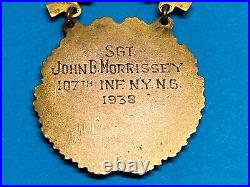
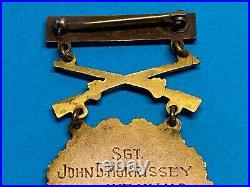
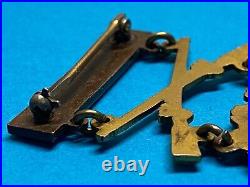
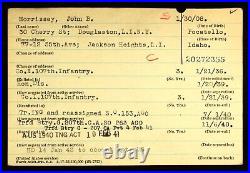
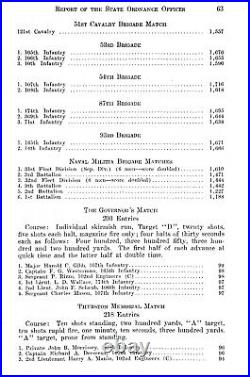
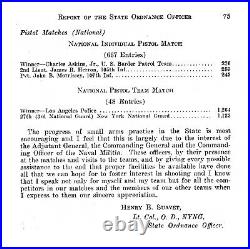

1938, ARMY LEVEL PRIZE, BRONZE, RIFLE COMPETITION, INFANTRY, NAMED, w/RESEARCH. This 1938 Infantry Army Level Prize for Rifle Competition was awarded to SGT John B. Morrissey, Company I, 107. SGT Morrissey was born on 30 January, 1908, Pocatello, Idaho. SGT Morrissey enlisted on 21 January 1936. When John Bacon Morrissey was born on January 30, 1908, in Pocatello, Idaho, his father, Harry, was 30 and his mother, Florence, was 23. He had two sons and two daughters with Anna R Morrissey. He died on February 3, 1982, in Aberdeen, Maryland, at the age of 74. These interwar Army marksmanship badges are highly sought after among collectors. We will include printed copies of the research artifacts. This Army level prize consists of three parts. Top bar that indicated either Army level or Corps / department level competition and served as a brooch to affix the assembled device to the uniform. The top bar is squared ended and ornamented with oak leaves, and was always worn with this bronze clasp and an enameled planchet prior to WWII. The top bar or brooch is a pin back with a functional rotating clasp closure. The second portion consists of an intermediate clasp of crossed arms to indicate the type of weapon that was used to earn the award rifle, pistol, or, soon thereafter, automatic weapons. In this case it has crossed rifles. The third, lower piece is a planchet, that when enameled, told the arm or the type of service, in this case, blue for Infantry. The central design is a bow and a pair of arrows. The planchet consists of three concentric designs. 0625 in diameter, displays a compound bow and two crossed arrows, a symbol of marksmanship. Outside of that is a center ring, 015 in width, which displays 13 stars. An oak-leaf wreath executed in bronze surrounds the entire design, making the planchet 1-1/2 in width. The combatant arms had bronze stars with the ring enameled in blue for Infantry.


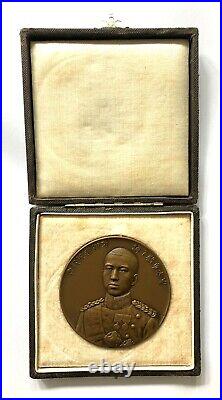
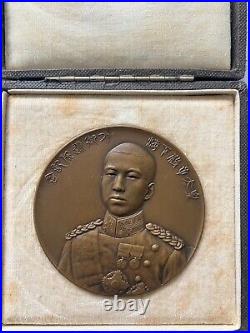
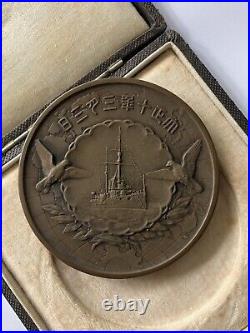
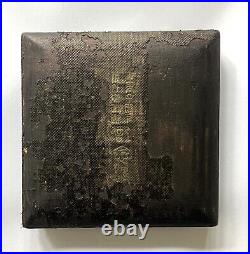

61mm in diameter and made by the Osaka Mint, this bronze table medal was issued in 1921 to commemorate a voyage made to Europe by the then Crown Prince (the future Emperor Hirohito). It is still in its titled and fitted case of issue, which is hard to find. This greatly increases the risk that an item can get permanently lost.


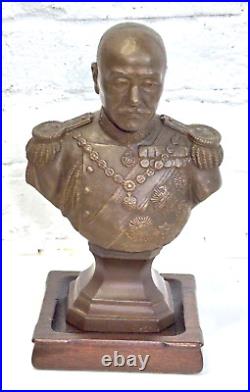
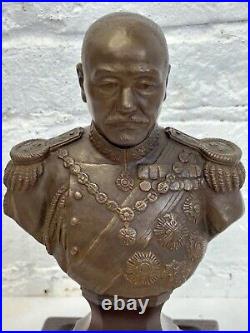
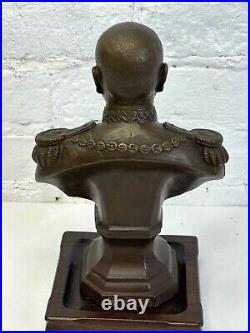
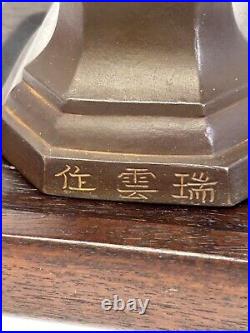
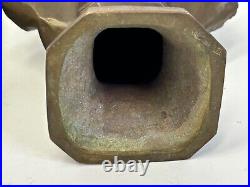
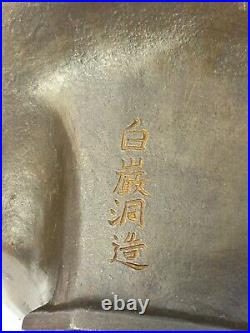
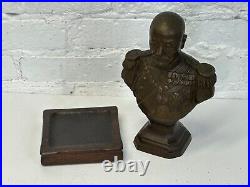
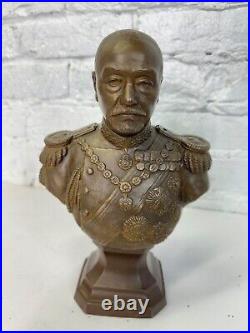

Vintage Japanese Imperial Naval Admiral Togo Heihachiro Bronze Statue Bust. It measures 9.5 inches tall in a wood base. The base measures 5.5 by 5.5 inches and in excellent condition.


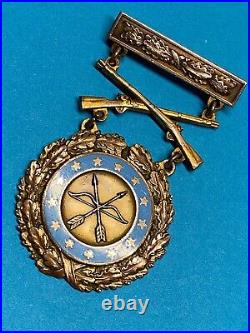
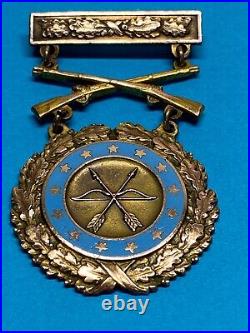
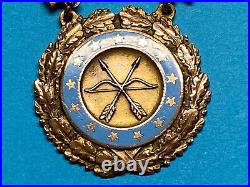
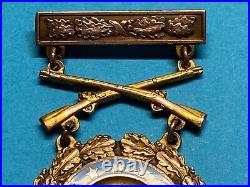
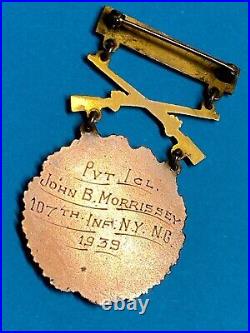
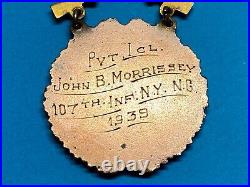
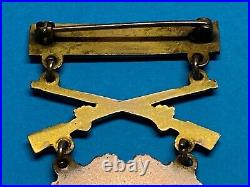
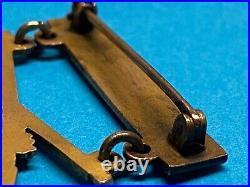
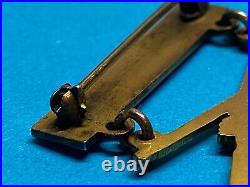
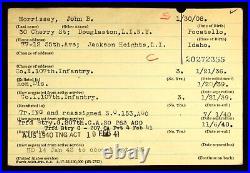
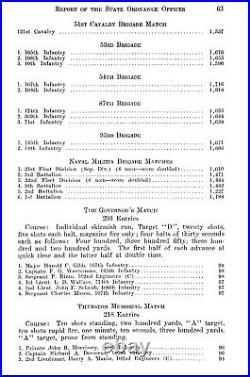
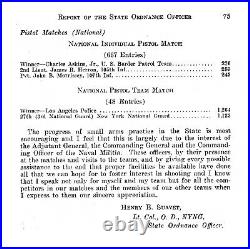

1938, ARMY LEVEL PRIZE, BRONZE, RIFLE COMPETITION, INFANTRY, NAMED, w/RESEARCH. This 1939 Infantry Army Level Prize for Rifle Competition was awarded to Private First Class John B. Morrissey, Company I, 107. SGT Morrissey was born on 30 January, 1908, Pocatello, Idaho. SGT Morrissey enlisted on 21 January 1936. When John Bacon Morrissey was born on January 30, 1908, in Pocatello, Idaho, his father, Harry, was 30 and his mother, Florence, was 23. He had two sons and two daughters with Anna R Morrissey. He died on February 3, 1982, in Aberdeen, Maryland, at the age of 74. These interwar Army marksmanship badges are highly sought after among collectors. We will include printed copies of the research artifacts. We are limited to 12 images, so there are more artifacts than what is displayed here. This Army level prize consists of three parts. Top bar that indicated either Army level or Corps / department level competition and served as a brooch to affix the assembled device to the uniform. The top bar is squared ended and ornamented with oak leaves, and was always worn with this bronze clasp and an enameled planchet prior to WWII. The top bar or brooch is a pin back with a functional rotating clasp closure. The second portion consists of an intermediate clasp of crossed arms to indicate the type of weapon that was used to earn the award rifle, pistol, or, soon thereafter, automatic weapons. In this case it has crossed rifles. The third, lower piece is a planchet, that when enameled, told the arm or the type of service, in this case, blue for Infantry. The central design is a bow and a pair of arrows. The planchet consists of three concentric designs. 0625 in diameter, displays a compound bow and two crossed arrows, a symbol of marksmanship. Outside of that is a center ring, 015 in width, which displays 13 stars. An oak-leaf wreath executed in bronze surrounds the entire design, making the planchet 1-1/2 in width. The combatant arms had bronze stars with the ring enameled in blue for Infantry.


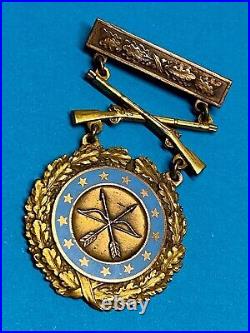
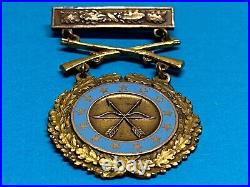
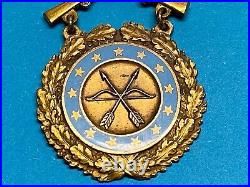
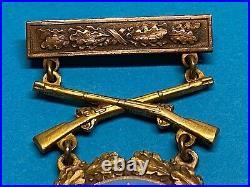
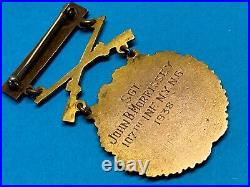
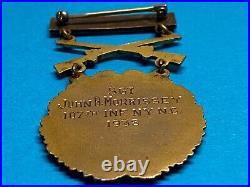
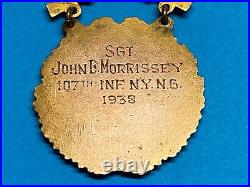
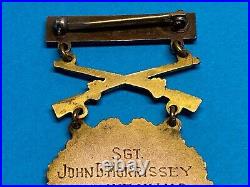
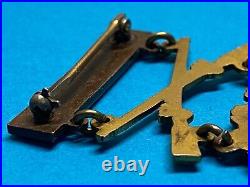
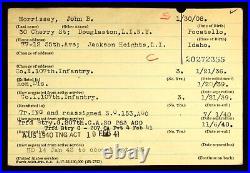
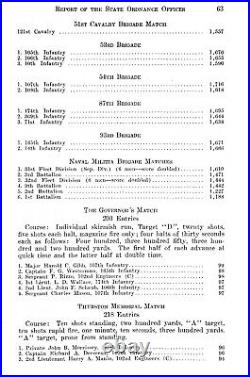
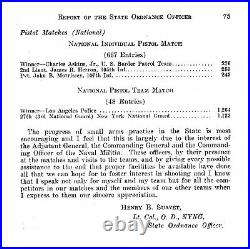

1938, ARMY LEVEL PRIZE, BRONZE, RIFLE COMPETITION, INFANTRY, NAMED, w/RESEARCH. This 1938 Infantry Army Level Prize for Rifle Competition was awarded to SGT John B. Morrissey, Company I, 107. SGT Morrissey was born on 30 January, 1908, Pocatello, Idaho. SGT Morrissey enlisted on 21 January 1936. When John Bacon Morrissey was born on January 30, 1908, in Pocatello, Idaho, his father, Harry, was 30 and his mother, Florence, was 23. He had two sons and two daughters with Anna R Morrissey. He died on February 3, 1982, in Aberdeen, Maryland, at the age of 74. These interwar Army marksmanship badges are highly sought after among collectors. We will include printed copies of the research artifacts. This Army level prize consists of three parts. Top bar that indicated either Army level or Corps / department level competition and served as a brooch to affix the assembled device to the uniform. The top bar is squared ended and ornamented with oak leaves, and was always worn with this bronze clasp and an enameled planchet prior to WWII. The top bar or brooch is a pin back with a functional rotating clasp closure. The second portion consists of an intermediate clasp of crossed arms to indicate the type of weapon that was used to earn the award rifle, pistol, or, soon thereafter, automatic weapons. In this case it has crossed rifles. The third, lower piece is a planchet, that when enameled, told the arm or the type of service, in this case, blue for Infantry. The central design is a bow and a pair of arrows. The planchet consists of three concentric designs. 0625 in diameter, displays a compound bow and two crossed arrows, a symbol of marksmanship. Outside of that is a center ring, 015 in width, which displays 13 stars. An oak-leaf wreath executed in bronze surrounds the entire design, making the planchet 1-1/2 in width. The combatant arms had bronze stars with the ring enameled in blue for Infantry.


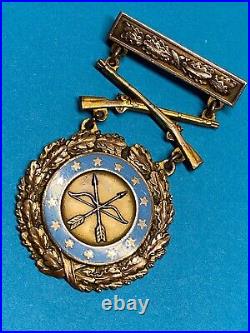
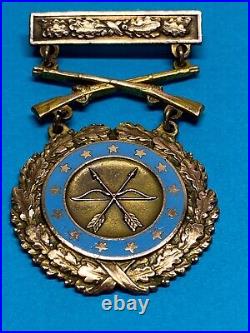
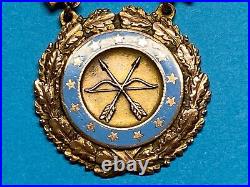
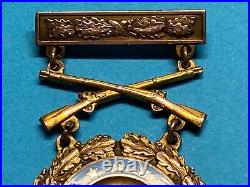
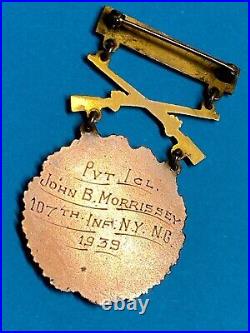
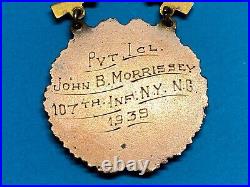
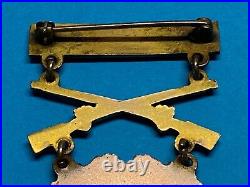
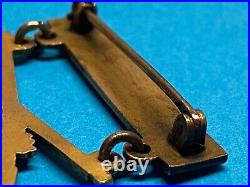
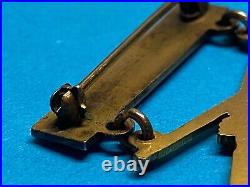
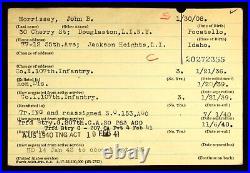
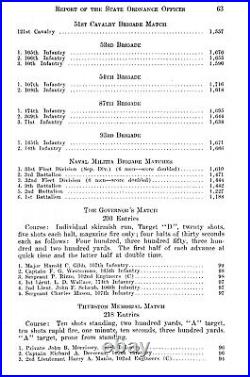
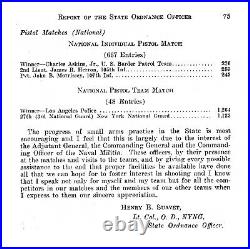

1938, ARMY LEVEL PRIZE, BRONZE, RIFLE COMPETITION, INFANTRY, NAMED, w/RESEARCH. This 1939 Infantry Army Level Prize for Rifle Competition was awarded to Private First Class John B. Morrissey, Company I, 107. SGT Morrissey was born on 30 January, 1908, Pocatello, Idaho. SGT Morrissey enlisted on 21 January 1936. When John Bacon Morrissey was born on January 30, 1908, in Pocatello, Idaho, his father, Harry, was 30 and his mother, Florence, was 23. He had two sons and two daughters with Anna R Morrissey. He died on February 3, 1982, in Aberdeen, Maryland, at the age of 74. These interwar Army marksmanship badges are highly sought after among collectors. We will include printed copies of the research artifacts. We are limited to 12 images, so there are more artifacts than what is displayed here. This Army level prize consists of three parts. Top bar that indicated either Army level or Corps / department level competition and served as a brooch to affix the assembled device to the uniform. The top bar is squared ended and ornamented with oak leaves, and was always worn with this bronze clasp and an enameled planchet prior to WWII. The top bar or brooch is a pin back with a functional rotating clasp closure. The second portion consists of an intermediate clasp of crossed arms to indicate the type of weapon that was used to earn the award rifle, pistol, or, soon thereafter, automatic weapons. In this case it has crossed rifles. The third, lower piece is a planchet, that when enameled, told the arm or the type of service, in this case, blue for Infantry. The central design is a bow and a pair of arrows. The planchet consists of three concentric designs. 0625 in diameter, displays a compound bow and two crossed arrows, a symbol of marksmanship. Outside of that is a center ring, 015 in width, which displays 13 stars. An oak-leaf wreath executed in bronze surrounds the entire design, making the planchet 1-1/2 in width. The combatant arms had bronze stars with the ring enameled in blue for Infantry.


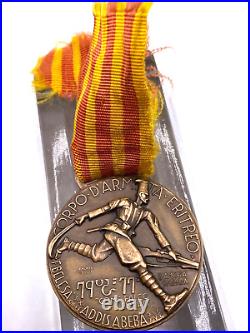
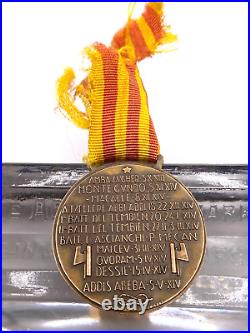
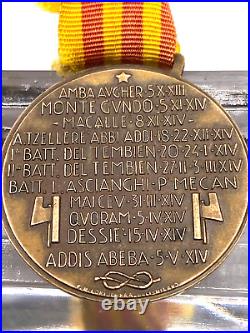
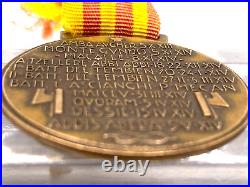
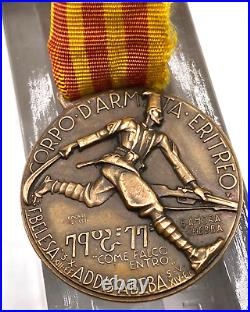
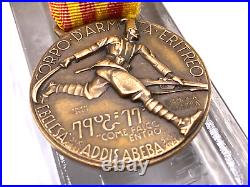
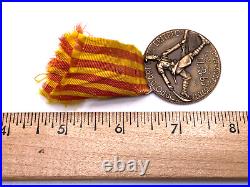

Vintage Rare bronze medal, high relief Italy Kingdom Eritrean Army Corps Medal from the late 1930’s. Beautiful condition with remnants of original ribbon. Please see all pics for condition, and feel free to request more photos.


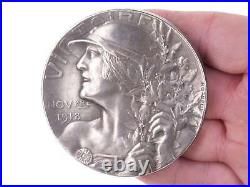



His designs were used on medals and the Art Deco style coinage of France during the 1930s.

















































































































